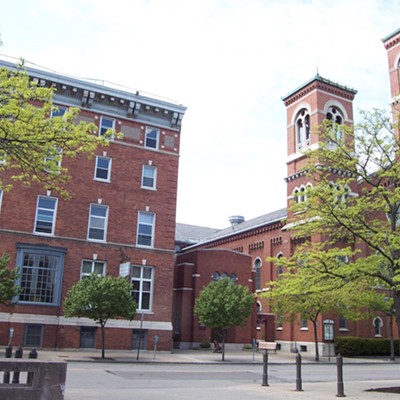[
{
"name": "500x250 Ad",
"insertPoint": "5",
"component": "15667920",
"parentWrapperClass": "",
"requiredCountToDisplay": "1"
}
]
At its peak in the 1950's, Rochester's population climbed above 332,000. The city was booming. But after losing about a third of its population, not to mention many businesses, Rochester was left with more than 3,000 vacant lots.
Instead of being empty eyesores, though, many of the lots have been repurposed for urban agriculture. More than 120 urban gardens have been created on vacant, city-owned lots spread out through all four quadrants, says Nathaniel Mich, a specialist in "edible education" and urban farming with Foodlink.
Interest in urban farming is strong in cities like Buffalo, Detroit, and Cleveland, Mich says. "It's definitely something we see growing here," he says. "Some of it is driven by the increasing cost of food. There's also the concern about climate change and the environment."
Rochester's urban farmers can grow flowers, vegetables, and herbs and raise farm animals. The city allows bees, four-footed livestock, and poultry – with the exception of roosters – says Mich. Current gardens range in purpose and style, with some designed for neighborhood beautification, others to provide food, he says.
Starting a garden or farm on city-owned land, however, isn't as simple as clearing the nearest vacant lot and planting vegetables. "Don't put anything in or on the ground until you have your team in place," says Mich. "Start with the people you'll need."
Foodlink and the Urban Agriculture Working Group are hosting an Urban Agriculture Conference from 9:30 a.m. to 5 p.m. on Saturday, May 12, at School 33, 500 Webster Avenue. It's open to anyone interested in urban agriculture, whether it's a group planning a community garden or individual residents wanting to create a garden at their home. Tickets are $10 per person, and you can register at rocurbangardens.org or facebook.com/RocUAWG.
The conference will offer a wide range of workshops and demonstrations, with topics including how to create and maintain an urban garden and comply with city policies.
The city requires a permit to cultivate a vacant lot, says Mich. The permits are free and are valid from March through December, but they're valid for only one growing season. Getting city officials to change that policy will also be discussed at the conference, he says.
The short-term nature of the permits means that urban farmers "don't have any long-term control over the land," Mich says. "The city sees urban agriculture as a temporary use for the land, and we would like to flip that to a legitimate longer-term use."
Mich and other urban farmers want the city to offer urban farmers a five-year permit with the right of first refusal if the city is going to sell the lot. And the zoning code needs to be updated to allow farmers to build a greenhouse or hoop house on lots in residential neighborhoods, he says. Currently, additional structures can't be added to the lot unless a house already exists there or will be part of the new construction.
Urban farming will never repurpose all of the city's vacant lots, and it will never meet the city's needs for fresh produce and other farm products, Mich says. But other cities are finding that urban agriculture is having a positive economic and social impact by creating jobs and encouraging investment in neighborhoods, Mich says.
Saturday's conference will also include a tour of community gardens in the Beechwood neighborhood, a seed swap, and a lunchtime panel discussion, "Food, Race, and Justice."
Farmland loss has had a huge impact on African-American farmers, especially in the South because of ambiguities in land titles, predatory developers, and a legal system that didn't protect former slaves who bought land.
Latest in News
More by Tim Louis Macaluso
-

RCSD financial crisis builds
Sep 23, 2019 -

RCSD facing spending concerns
Sep 20, 2019 -

Education forum tomorrow night for downtown residents
Sep 17, 2019 - More »






